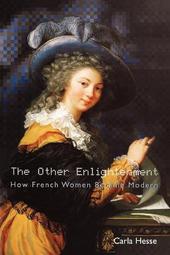
|
The Other Enlightenment: How French Women Became Modern
Paperback / softback
Main Details
| Title |
The Other Enlightenment: How French Women Became Modern
|
| Authors and Contributors |
By (author) Carla Hesse
|
| Physical Properties |
| Format:Paperback / softback | | Pages:256 | | Dimensions(mm): Height 235,Width 152 |
|
| Category/Genre | Literary studies - c 1500 to c 1800 |
|---|
| ISBN/Barcode |
9780691114804
|
| Classifications | Dewey:305.4094409033 |
|---|
| Audience | | Professional & Vocational | | Tertiary Education (US: College) | |
|---|
| Illustrations |
6 tables, 9 halftones
|
|
Publishing Details |
| Publisher |
Princeton University Press
|
| Imprint |
Princeton University Press
|
| Publication Date |
30 March 2003 |
| Publication Country |
United States
|
Description
The French Revolution created a new cultural world that freed women from the constraints of corporate privilege, aristocratic salons, and patriarchal censorship, even though it failed to grant them legal equality. Women burst into print in unprecedented numbers and became active participants in the great political, ethical, and aesthetic debates that gave birth to our understanding of the individual as a self-creating, self-determining agent. Carla Hesse tells this story, delivering a history of how French women have used writing to create themselves as modern individuals. Beginning with the marketplace fishwives and salon hostesses whose eloquence shaped French culture low and high and leading us through the accomplishments of Simone de Beauvoir, Hesse shows what it meant to make an independent intellectual life as a woman in France. She offers portraits of the work and mental lives of many fascinating women - including both well-known novelists and now-obscure pamphleteers - who put pen to paper during and after the Revolution. We learn how they negotiated control over their work and authorial identity - whether choosing pseudonyms like Georges Sand or forsaking profits to sign t
Author Biography
Carla Hesse is Professor of European History at the University of California, Berkeley. She is the author of "Publishing and Cultural Politics in Revolutionary Paris" and the coeditor of several books, including "Culture and Identity in Early Modern Europe". She is a member of the editorial board of the journal "Representations".
Reviews"[Hesse identifies] a (relatively precise) historical moment as being of seminal importance in one possible definition of modernity. When that has been grasped, the full ingenuity of her arguments and the considerable quality of her writing can emerge."--Richard Parish, Times Higher Education Supplement "Hesse provides a unique and well-documented look at women's history..."--Library Journal "Carla Hesse ... deploys Kant's ambivalent definition of freedom as the ground for a more hopeful and explicitly liberal feminist reconstruction of female agency... This is a concise book on a vast topic, one that is sure to inspire further research and discussion."--Joan B. Landes, American Historical Review "Hesse's study is persuasive not only because of its historical rigor, logical presentation and clarity of style, but also because of its explicit values... [Her] liberal values offer a particularly good point of departure for her historical study of women's transition to modernity... Hesse provides a thorough, well-documented and convincing explanation of women's historical impediments and achievements in their roles as modern citizens."--Claudia Moscovici, Nineteenth Century French Studies "Short, suggestive, and brilliant... A powerfully crafted historical vision presented ... in lucid and engaging prose... In her deft combination of quantitative research and critical readings, Hesse provides a model of how to pursue the social history of ideas."--David A. Bell, New Republic "This stimulating study of French women and publishing between 1789 and 1800 contributes significantly to both the cultural history of the French Revolution and current debate about the Revolution's impact on women... Hesse argues convincingly that after 1789 French women found new opportunities to define themselves in print as modern individuals and that post-revolutionary successors benefited from the new publishing realities."--Linda L. Clark, Journal of Social History "Extremely challenging and at the same time immensely enjoyable... [R]eaders will definitely benefit from the chapters, none of which is without interest."--Marie Lathers, French Review
|